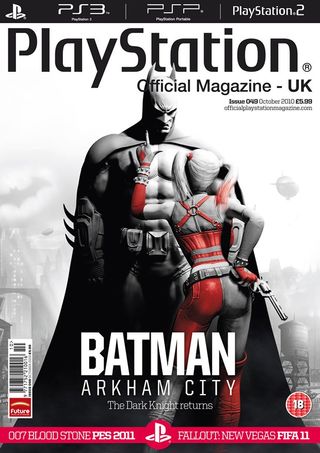Batman: Arkham City. Not out until 2011. But you can get this behind-the-scenes interview right now
Rocksteady talks about making the follow-up to last year's GOTY
OPM UK: How has the motion capture process developed since the original game?
SH: Our motion capture process has developed significantly since Batman: Arkham Asylum. Firstly, Rocksteady made the decision to build a custom, dedicated mocap wing to the studio. The new mocap studio has everything that we need for great capture and has space for a full armoury of weapons, crash mats and a load of other props. We also overhauled the entire motion capture pipeline so that we can grab even more of the subtle movement of our actors.
OPM UK: How big of an impact do you feel that the musical score can have on the game's immersion?
SH: The intelligent use of music and audio is a very powerful tool in creating a genuine sense of immersion in a game world. The musical score is a critical component of our game and our Audio Director, Nick Arundel, continues to do some incredible work in composing a score that is both unique to the Arkham series, but is also laced with those signature orchestral Batman riffs that evoke the power and righteous menace of the Dark Knight.
There is a lot of thought and planning that goes into creating those stand-out, highly immersive cinematic moments for the player and, as with most elements of the game, it is only possible to achieve via collaboration between many different people in the studio bringing together creative vision and technical execution.
The key to generating a genuine sense of immersion in the game lies in the way that the score is linked into the action of the player. Our score is designed and composed with player immersion and interactivity at its heart. The score is broken down into thousands of component parts, which are then played depending on the actions of the player.
The Invisible Predator encounters are a great example of this; when the player first enters the room, the music sits on a certain level, but when they take down their first thug the music steps up to build the tension. If they are discovered, the music will jump to a different track and if they are fired upon, a different track entirely will play. All of these decisions are made with player immersion in mind.
Sign up to the GamesRadar+ Newsletter
Weekly digests, tales from the communities you love, and more
OPM UK: How does it feel to be a part of such a rich universe? Would you like to introduce anything to the canon permanently?
SH: It is simply a privilege to work on a Batman game. We have a great deal of creative flexibility to tell our own stories and create intriguing and compelling challenges for Batman. All of that work is built on the incredibly solid foundations that DC Comics has built over decades of fantastic story telling. We are always pushing to innovate and introduce new and unexpected experiences for the player.
OPM UK: You’re one of the few big UK AAA studios. Why do you think there are so few?
The UK games industry still have some of the best talent in the world and there are still many great studios in the UK which make 'AAA' quality games, but as international competition grows and top-tier games development budgets increase, making 'AAA' games just gets tougher every year and many projects don’t survive.
As an industry, if we sharpen our methods, secure good projects and continue to punch above our weight, then we might just compete. If the UK government can be as forward thinking as some other countries in this regard we could return to the heady days of a world-leading games industry.
OPM UK: Which of the Batman film actors would you like to play your Batman if Arkham City was a film?
SH: I’m going to cheat on this one and say a younger Clint Eastwood.
Don't forget - for more can't-get-it-anywhere-else Batman: Arkham City knowledge, pick up the latest issue of the UK's Official PlayStation Magazine. You can't miss it. One more time, here's the cover:

Sexy.
September 3, 2010
Most Popular


